AI chatbots have emerged as powerful tools for B2B businesses, revolutionizing the way companies interact with their customers. By leveraging artificial intelligence, these chatbots offer a range of economic advantages, such as reducing labor costs, enhancing customer satisfaction, and increasing sales productivity. In this article, we will explore the economic benefits that AI chatbots bring to B2B organizations, highlighting their potential impact in streamlining business operations and driving profitability. Harnessing the potential of AI chatbots is no longer a luxury; it is a necessity for B2B businesses looking to stay competitive in today’s digital landscape.
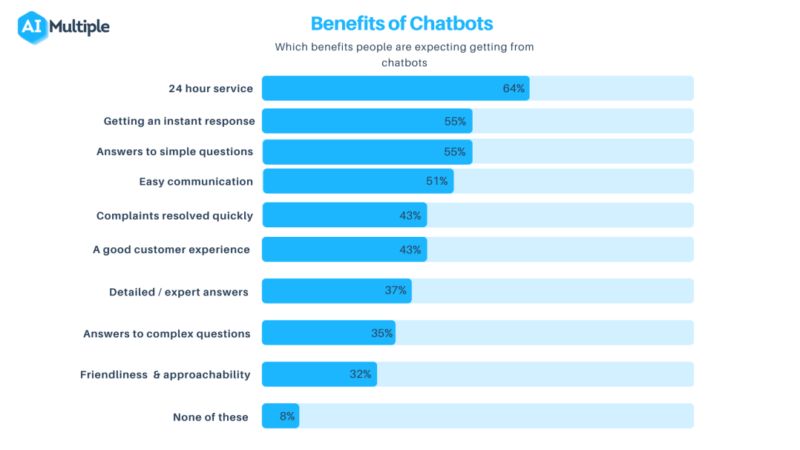
This image is property of research.aimultiple.com.
1. Cost Reduction
1.1. Reduced customer support costs
In the B2B industry, customer support is a critical aspect of maintaining strong relationships with clients. However, the cost associated with providing quality customer support can be significant. AI chatbots offer a cost-effective solution by automating a large portion of the customer support process. By using chatbots, businesses can reduce the number of support agents required to handle customer inquiries, resulting in substantial cost savings. Moreover, AI chatbots can handle multiple enquiries simultaneously, allowing businesses to efficiently address customer needs without incurring additional expenses.
1.2. Lower employee expenses
Employee expenses account for a significant portion of a company’s operational costs. However, with the implementation of AI chatbots in B2B businesses, these expenses can be significantly reduced. AI chatbots are specifically designed to handle repetitive and mundane tasks, which were previously performed by employees. By automating such tasks, businesses can streamline their operations and allocate their human resources to more value-added activities. This not only results in increased operational efficiencies but also reduces employee expenses, as fewer personnel are required to perform the same tasks.
2. Increased Efficiency
2.1. Intelligent automation
Intelligent automation is a key feature of AI chatbots. These bots are equipped with advanced algorithms and machine learning capabilities that enable them to understand and respond to customer inquiries effectively. By utilizing artificial intelligence, chatbots can analyze customer queries, identify patterns, and provide accurate and relevant responses. This not only saves time but also enhances the overall efficiency of the customer support process. Furthermore, AI chatbots can continually learn from customer interactions, improving their performance over time.
2.2. Streamlined processes
Implementing AI chatbots in B2B businesses helps streamline various processes, resulting in increased efficiency. For instance, AI chatbots can assist in lead qualification by asking relevant questions and assessing the potential of a lead. This eliminates the need for manual lead scoring, saving time and resources. Additionally, chatbots can automate repetitive tasks such as data entry and form filling, allowing employees to focus on more strategic and value-added activities. By automating these processes, businesses can reduce errors, eliminate bottlenecks, and improve overall operational efficiency.
3. Enhanced Customer Service
3.1. 24/7 availability
One of the significant advantages of AI chatbots is their ability to provide round-the-clock customer support. Chatbots can handle customer queries, provide information, and assist with basic troubleshooting at any time, day or night. This 24/7 availability ensures that customers can access support whenever they need it, regardless of their geographical location or time zone. By offering uninterrupted service, businesses can enhance customer satisfaction and build stronger relationships with their clients.
3.2. Personalized interactions
AI chatbots are not only capable of providing instant responses but can also personalize interactions. By leveraging machine learning and natural language processing, chatbots can understand user preferences, previous interactions, and purchase history. This enables them to offer personalized recommendations, tailor-made solutions, and targeted marketing messages. Personalization enhances the customer experience, making it more engaging and relevant. Through personalized interactions, businesses can strengthen their connection with customers and ultimately drive loyalty and retention.
4. Improved Lead Generation
4.1. Targeted marketing campaigns
AI chatbots can significantly improve lead generation efforts by assisting businesses in designing and executing targeted marketing campaigns. Chatbots can interact with potential leads, gather relevant information, and provide personalized recommendations. By leveraging data analytics and machine learning algorithms, chatbots can identify potential customers and segment them based on various criteria. This allows businesses to create highly targeted and effective marketing campaigns that are more likely to convert leads into actual customers.
4.2. Qualifying and nurturing leads
AI chatbots can play a crucial role in qualifying and nurturing leads, saving time and resources for B2B businesses. Chatbots can engage with leads, ask qualifying questions, and determine the level of interest and potential of each lead. Based on this information, chatbots can prioritize leads, ensuring that sales teams focus their efforts on the most promising opportunities. Furthermore, chatbots can nurture leads by providing them with valuable information, answering their queries, and guiding them through the sales funnel. This personalized approach increases the likelihood of lead conversion and ultimately boosts sales revenue.
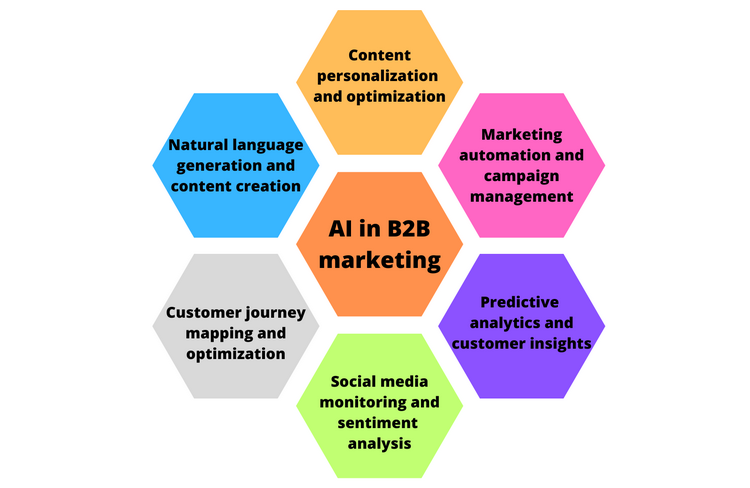
This image is property of www.resonatehq.com.
5. Better Data Collection and Analysis
5.1. Gathering valuable customer insights
AI chatbots act as a valuable source of data collection. Through customer interactions, chatbots can gather valuable insights regarding customer preferences, pain points, and expectations. This data provides businesses with a deeper understanding of their target audience, enabling them to make informed business decisions and develop more targeted strategies. Additionally, chatbots can identify common customer issues and provide feedback to improve products or services. By leveraging the data collected by chatbots, businesses can enhance their offerings and deliver better customer experiences.
5.2. Predictive analytics
By integrating AI chatbots with data analytics capabilities, businesses can leverage predictive analytics to anticipate customer behavior and make proactive business decisions. Through the analysis of historical data, chatbots can identify patterns and trends, enabling businesses to predict future customer needs and preferences. This allows businesses to proactively develop strategies, optimize their resources, and deliver personalized experiences based on predictive insights. Predictive analytics helps businesses stay ahead of the competition and adapt to changing market dynamics.
6. Scalability
6.1. Handling large volumes of inquiries
As businesses grow, managing large volumes of customer inquiries can become challenging. AI chatbots offer a scalable solution by efficiently handling a high volume of inquiries simultaneously. Chatbots can respond to multiple customers in real-time, ensuring that no inquiries are left unanswered. This scalability allows businesses to effectively manage customer support, even during peak periods or sudden spikes in demand. By providing a seamless customer experience, businesses can build a reputation for reliability and responsiveness, further enhancing customer satisfaction and loyalty.
6.2. Expanding customer base
With AI chatbots, businesses can easily expand their customer base without the need for additional resources. Chatbots can handle inquiries and provide support to a large number of customers, irrespective of their geographical location. This enables businesses to reach new markets and cater to customers globally without the need for physical presence or additional personnel. By leveraging AI chatbots for customer support, businesses can unlock new growth opportunities and expand their reach without incurring significant costs.
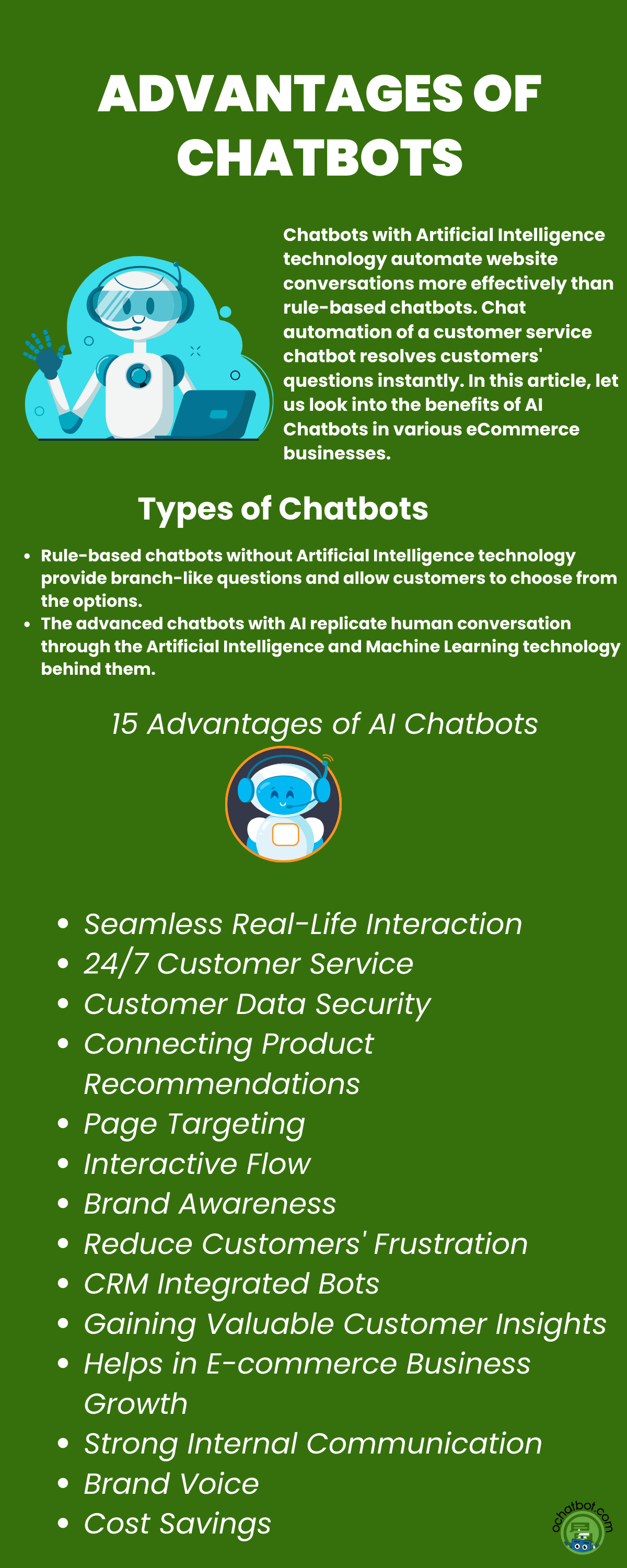
This image is property of ochatbot.com.
7. Competitive Advantage
7.1. Differentiation in the market
The implementation of AI chatbots provides businesses with a distinct competitive advantage in the market. Chatbots offer a modern and innovative customer support experience, setting businesses apart from their competitors. By embracing this technology, businesses showcase their commitment to providing exceptional customer service and leveraging cutting-edge solutions. This differentiation helps businesses attract and retain customers, ultimately driving growth and profitability.
7.2. Swift response time
In today’s fast-paced business environment, customers expect quick and efficient responses to their inquiries. AI chatbots excel in delivering swift responses, ensuring that customer queries are addressed in a timely manner. With their ability to handle multiple conversations simultaneously, chatbots eliminate long wait times and provide instant assistance. Swift response time not only enhances customer satisfaction but also positively impacts the overall customer experience. By meeting and exceeding customer expectations, businesses can gain a competitive edge and foster long-term customer loyalty.
8. Integration with Existing Systems
8.1. Seamless communication with CRM and ERP systems
AI chatbots can seamlessly integrate with existing Customer Relationship Management (CRM) and Enterprise Resource Planning (ERP) systems, enhancing workflow efficiency. By connecting with CRM systems, chatbots can access customer data, purchase history, and interaction details, providing a holistic view of the customer during conversations. This enables chatbots to deliver personalized responses and recommendations based on the customer’s specific needs and preferences. Integration with ERP systems allows chatbots to access real-time inventory information, order status, and delivery updates, providing accurate and up-to-date information to customers.
8.2. Integration with other software tools
AI chatbots can integrate with other software tools, further streamlining business processes. For example, chatbots can be integrated with project management tools to provide status updates, task assignments, and deadline reminders to team members. Integration with collaboration tools enables chatbots to schedule meetings, send reminders, and facilitate efficient communication among team members. By seamlessly integrating with various software tools, chatbots become a central hub for managing and automating various aspects of business operations, improving overall productivity and collaboration.
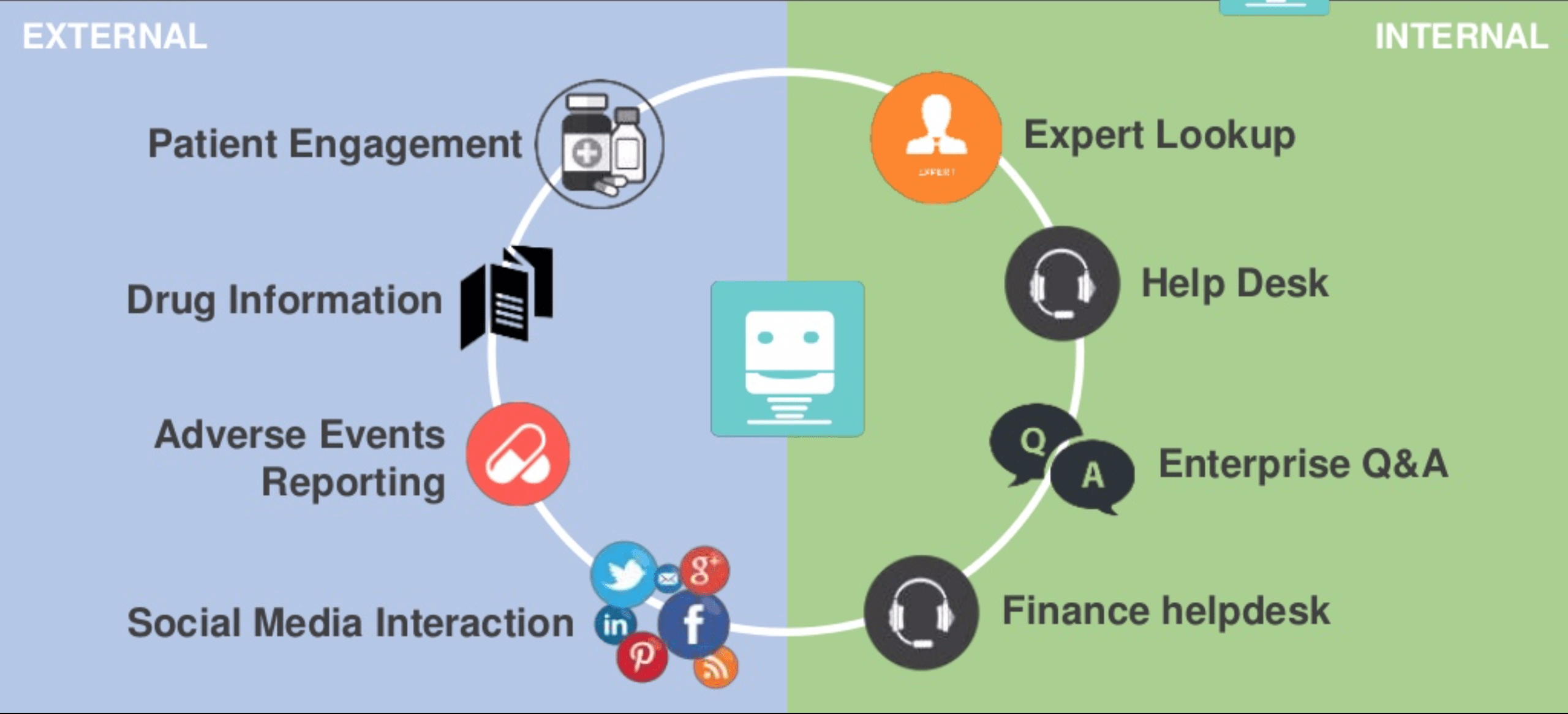
This image is property of research.aimultiple.com.
9. Simplified Sales Process
9.1. Automated lead qualification
AI chatbots can simplify the sales process by automating lead qualification. Chatbots can engage with potential leads, ask pre-defined qualifying questions, and determine the level of interest and fit. This eliminates the need for manual lead qualification, saving valuable time for sales teams. By automating this process, businesses can ensure that sales representatives focus their efforts on leads with the highest potential, increasing the efficiency and effectiveness of the sales process.
9.2. Guided product recommendations
AI chatbots can assist in the sales process by providing guided product recommendations to customers. By analyzing customer preferences, needs, and past purchases, chatbots can suggest the most suitable products or services. This personalized recommendation enhances the customer experience and increases the chances of a successful sale. Additionally, chatbots can address customer concerns or objections and provide relevant information to support their decision-making process. Guided product recommendations streamline the sales process, making it more efficient and effective.
10. Cost-Effective Training and Onboarding
10.1. Reduced training time and costs
Training new employees can be both time-consuming and expensive. However, by leveraging AI chatbots for training and onboarding, businesses can significantly reduce training time and costs. Chatbots can provide interactive and on-demand training modules to new employees, allowing them to learn at their own pace. They can simulate real-life scenarios, test the employees’ knowledge, and provide instant feedback. By automating the training process, businesses can optimize their training resources and ensure a consistent and effective onboarding experience for every new employee.
10.2. Quick onboarding for new employees
The onboarding process plays a crucial role in ensuring the smooth integration of new employees into a business. AI chatbots can expedite this process by providing quick and comprehensive onboarding assistance. Chatbots can guide new employees through various onboarding tasks, such as filling out forms, accessing training materials, and connecting with relevant team members. By providing instant support and information, chatbots enable new employees to quickly familiarize themselves with the company’s processes and culture. This accelerates the onboarding process, allowing new employees to become productive members of the team in a shorter period.
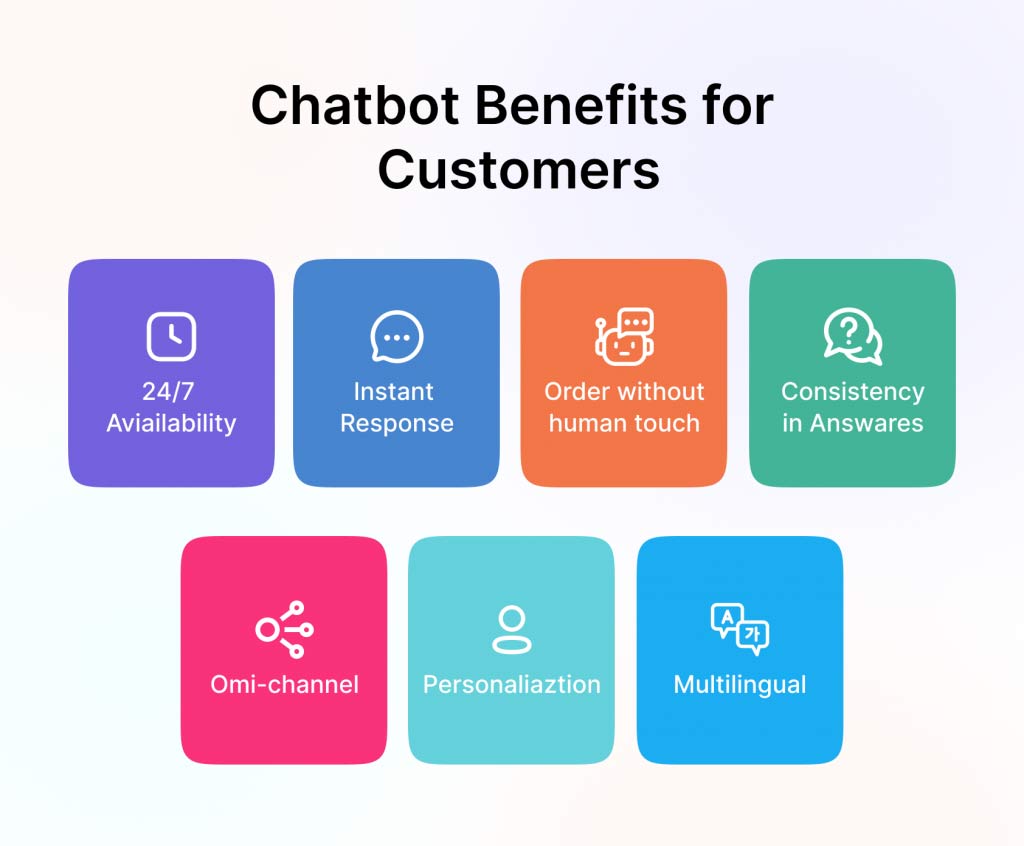
This image is property of www.revechat.com.

